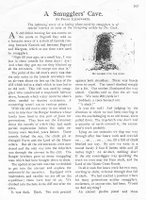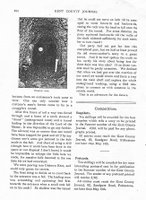Frank Illingworth's Puzzle Tunnel

"Light at the end of the tunnel" Showing a typical cross section of the tunnel shape. This picture is taken from within the tunnel, on the homeward stretch, looking out (surprise!)
The pictures below show how small and cramped the tunnel is. It is a crawl all the way. The second picture also shows how close to the surface parts of it are, with roots growing through the ceiling (c.1990)

 These pictures shows the famous smuggler carving that Illingworth spoke about in his account. It is still there, fully intact, after over two hundred years. Unfortunately it is difficult to make out on the first photo, which is sadly over-exposed. The second picture traces the lines and shows how the carving would have looked. It is not known what the PO stands for.
These pictures shows the famous smuggler carving that Illingworth spoke about in his account. It is still there, fully intact, after over two hundred years. Unfortunately it is difficult to make out on the first photo, which is sadly over-exposed. The second picture traces the lines and shows how the carving would have looked. It is not known what the PO stands for.-----

The incredibly small dimensions of the tunnel!

The picture below shows the tunnel entrance in the cliff face, as it was in 1991. In the 15 years since then, this part of the cliff face has eroded considerably. As the picture shows, back in 1991 the tunnel entrance was only about 6 feet from the ground, enabling an easy climb into it from the beach below.

Pegwell Bay,Kent -smuggling tunnel —see plan
This tunnel has been mentioned in many publications. The first appears to be an account of 1938 in the Kent County. Journal written by F. Illingworth. It records his visit to a tunnel placed between Pegwell Hay and ihich extended many yards from the cliff face to a domed room. During his exploration, which involved continuous crawling Illingworth found a pin—fire pistol and some excise officer’s buttons,
John Vigar identified and, visited the passage early in 1983. It is situated in a chalk cliff between Pegwell Bay Hoverport and the Belle Vuë Hotel. The entrance is about 7 ft. from the base of the cliff at TR 3576 Visits have to be between tides,
The passage can be explored for some ‘l7 I t is a low crawl for the whole distance, the average dimensions being 6 high and f5cm wide, with some parts only 35cm high. It was originally about lm high but the floor is now covered with. deposits.
Illingworth!s account tells that after 200 yards a shaft was reached,which, according to him, was ..the method by which smuggled goods were taken in and out. This shaft is 1 in. It is of rough construction and the junction between chalk and s-oil can be clearly seen near the top. It is 3 high and blocked with wood at the top. The
entrance is about 15m down the cliff and the tunnel rises over its ent-ire length., It is not straight but veers about.
At intervals along the roof are cylindrical holes, as might be made by a metal pipe, about 2 in diameter. They are deep and could go to the surface but their function is uncertain.
After the shaft the tunnel continues but with a rougher construction. Illingworth says that he crawled “on and on and on..’ but encountered a fall of chalk. He dug through this but, was unable to continue although he saw a domed room and beyond it a co’ntinuation of the tunnel.
John Vigar crawled 20m beyond the shaft and came to a blockage and possibly a second shaft. This could be the ‘domed room’ or it may lay further on. This stretch is extremely tight and it is necessary to back out.
There is a lot of “:graffiti in the tunnel, mostly dating from the mid—1950s. There are also some more ancient inscriptions, mostly initials, beautifully cut, probably of late 19th century origin. In. addition notches cut in the walls with crude carvings of four men pointing look even earlier.
It. is not pOssible to guess why the tunnel was dug, although considerable effort must have been eml in doing so. How far it goes we do not know. The only way of exploring further would be to uncap the shaft(s) and use them to lift out excavated materiaL
The tunnel entrance is sometimes blocked with chalk rubble to prevent children from entering. If these are removed to gain entry, they should be replaced afterwards.
References C.S.S.Newsletter vol 25 no.? Apl.1983
C.S v. 6 p. p56.
The colour photos above were taken by myself when the tunnel was revisited in 1991.
By FRANK ILLINGWORTH.
The following story of a hiding place used by srnugglers is of special interest in view of the foregoing article by Dr. Cock.
“Nigh 50 year ago, as a small boy, I was lost in them tunnels for three days ! Aye, And when they got me out they blocked up all the entrances. All except one that is.’’
With the old man’s story in our mind we went to interview the Banger brothers whose family have lived in this part of Kent for generations. They bore out the statement about the tunnels of which they had made partial exploration before the main en trances were blocked, years before. These tunnels linked the sea, the chalk pit at Osingall Farm and the Lord of the Manor cellars. But all the old entrances were now closed and the only way into the labyrinth was through the air-vent in the cliff. The Banger brothers gave us many smuggling tales which had been brought down to them.
The upshot of our talk was that we decided to get into the air-vent and explore the underworld for ourselves. Equipped with implements and candles we set off on the expedition ; there were four of us. We climbed into the hole in the cliff one after the other.
Suddenly a voice boomed out.
‘‘A shaft !‘‘
It was the well! And judging by the direction in which we had been crawling it was the one belonging to an old house, since pulled down. The trap-hatch was down and a quantity of earth covered it, the excise- men’s work probably.
Lying on our stomachs we dug our way through after four hours work and crawled on . . . on . , . on , . . on, till a fall of chalk blocked our way. By now we were in a tunnel barely 2 foot 6 inches wide and 22 inches high ! An air-duct, nothing else. If the old worm-digger was speaking the truth we were near the Main shaft, and the Lord of the Manor Cross Roads.
In all it took five hours work for two men, working in shifts, to break through that fall of chalk. We had reached a position where for many generations neither smugglers, excisemen, or anyone else, had been. Would we find anything?
An ancient pin-fire pistol and three buttons from an exciseman’s tunic came to view. One can only surmise how a customs’s man’s button came to be in a smugglers tunnel.
After five hours of toil a way was forced through and a beam of a torch showed a “dome” (underground room) and a tunnel leading in the direction of the Lord of the Manor. It was impossible to go any further. The air-vent was so narrow that one would have been trapped for good and all if by any chance one’s arms got jammed in the hole made in the fall. And short of using a drill (though how it could have been done in the space at our disposal I don’t know) it would be impossible to enlarge the little hole we made, for massive falls hemmed in the one little bit we had excavated.
We were peering into Unkown Kent, and could only guess its secrets.
The final thing to decide us to crawl back to the entrance was a fall. The leading man was scrambling and squirming feet first towards the entrance when a small rock fell on to his neck! So shallow was the tunnel that he could not move an inch till he man aged to work forwards and backwards, easing the rock over his head to fall onto the floor of the tunnel. For some distance the party squirmed backwards till the walls of the shaft widened sufficiently for each mem ber to turn round!
Our party had not got far into this unexplored part, but we had at least proved the old worm-catcher’s story to a great extent. And if he had spoken the truth so far, surely his story about being lost for three days was true also? If so those tunnels must be pretty extensive. We decided that when we had got over the exertion of our crawl we would return and force a way into the main shaft and explore the whole underground working, using a field telephone to connect us with someone in the outside world.
That is an adventure for the future.
An article on the tunnel by John E. Vigar (C.S.S. Newsletter, 1983)
Note in the picture of the entrance and cliff face on the first page of the below article (taken c. 1983) the medieval well shaft is not visible at all. On the photo I took, posted earlier (c1991) the well shaft is clearly visible, due to cliff erosion that has occurred since the picture in the 1983 article below.











4 Comments:
I went down this tunnel when I was about 13! Lookin back on it now it was stupid, but I'm still here to tell the tale, me and 2 friends got all the way to the 1st shaft but then turned back as the next part of the tunnel looked slightly collapsed and went into like a ditch, alot narrower than any other part! Its still quite a clear memory too! =)
Yep. . . . we did it and lived to tell the tale! it woz scary, stupid and dangerous but a brilliant memory and can laugh about it now! the only lights we had were 2 bicycle lights - 1 red 1 white and obviously theres no room to turn round so we had to crawl out backwards when we realised we couldnt get thru the other end! mad stuff! =)
Filmed down here a couple of days ago, Very good! Unfortunately I didn't get to the end, too small and enclosed.
Loving your blog anyway great!
All the best Ian
hi, good site very much appreciatted
Post a Comment
<< Home